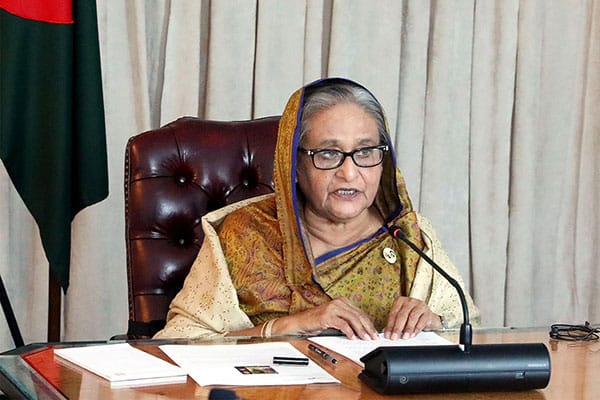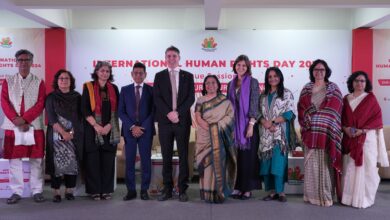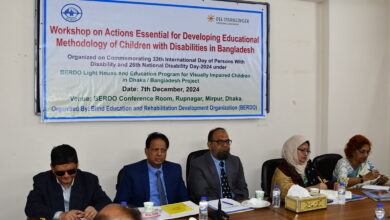The Prime Minister demanded that the repatriation of Rohingya be strengthened on an ‘urgent’ basis

Prime Minister Sheikh Hasina has demanded intensified global actions with “real urgency” to repatriate Rohingyas , saying the inaction of major international powers on the crisis has shocked Bangladesh. However, in spite of limited resources, Bangladesh gave shelter to the refugees considering the humanitarian aspect.
”As I repeatedly said they (Rohingyas) are Myanmar nationals and hence, they must go back to their homeland, Myanmar, in safety and dignity “ she told a high-level interaction of global stakeholders on the sidelines of the UN General Assembly (UNGA) session in New York on Tuesday afternoon (Bangladesh Time early today), reports BSS.
Sheikh Hasina insisted that the issue was a matter of regional and global security concerns and therefore it needed urgent resolution while “I would like to emphasize that whatever we are doing in Bangladesh is purely on a temporary basis”.
She said the international community “must do everything possible to make sure the Rohingyas return to their homeland as they themselves also wish to return to their home”.
Simultaneously, the Premier put her weight towards the campaign to expose to justice the people responsible for the persecution of the minority Rohingya community for the sake of justice and infusing a sense of confidence among the victim population in returning their home.
The virtual meeting titled “High-Level Side Event on Forcibly Displaced Myanmar Nationals (Rohingya) crisis: Imperatives for a Sustainable Solution” was held under Bangladesh auspices ahead of the Premier’s scheduled UNGA address on September 24.
Officials said the meeting was organized as part of Dhaka’s efforts to highlight the crisis in the important general discussions of the UAGA.
The meeting was co-sponsored by eight cross-regional countries and organizations including the United Kingdom (UK), Ireland, Saudi Arabia, Turkey, Organisation of Islamic Cooperation (OIC) and the European Union (EU).
The ঢ়remier said since that mass exodus in 2017, at all the successive UNGAs, she placed specific proposals for a sustainable solution to the crisis while “my government has maintained bilateral engagements with Myanmar”.
“At the regional front, we have tried to take on board the major powers, including China and India. We have all along tried to have more active involvement of the ASEAN,” Sheikh Hasina said.
“At the multilateral front, we kept the issue on the table by UN resolutions engaging important countries and the UN agencies but sadly our efforts for the hapless, uprooted Myanmar Nationals returning home to Myanmar has not generated any tangible outcome yet,” she said.
“Till today, not a single one of them could go back to their homeland,” she added.
Sheikh Hasina said for the last four years, Bangladesh awaited with high hopes that these displaced people could go back to their own homes in their motherland Myanmar in safety, security and dignity, reposing “our trust in the global assembly and community for their repatriation”.
“However, our calls have remained unheeded and our hopes unfulfilled. We are now in the fifth year of the crisis. Yet, we still hold the hope for a durable solution to this crisis,” she said.
The PM said resolving this humanitarian crisis appeared a collective responsibility as its implication goes beyond borders and warned that any failure in doing so immediately would “jeopardize our collective security”.
“The growing frustration over the lack of progress in repatriation entices many to get involved in criminal activities, and they are easy prey to extremist ideologies. This could potentially destabilize the entire region,” she said.
The Prime Minister suggested a five-point international course of action to resolve the crisis with the first one being an investment of “all our efforts” as the top priority.
Secondly, she said, the changed political scenario in Myanmar created uncertainty in the repatriation process, requiring a revision in international efforts to find a resolution of this crisis.
Sheikh Hasina sought enhanced efforts of ASEAN in the current perspective as “we believe the ASEAN has an important responsibility” when its actions would largely influence Myanmar in view of the present situation.
“Fourthly, we must remember humanitarian assistance is essential but in no way a permanent solution. The UN and the partners must undertake tangible actions and projects in Myanmar to create an environment conducive for repatriation and their sustainability,” she said.
She added: “So far, we have not seen any such progress”.
Sheikh Hasina said accountability for the persecution committed against the Rohingyas was important to create confidence among this forcibly displaced population.
“Impunity for such heinous crime should not be allowed on all accounts,” she said, adding Bangladesh extended its support to the ongoing international efforts to ensure the persecutors’ accountability particularly in the International Court of Justice (ICJ).
The PM also sought louder global supports to other international mechanisms created by the UN General Assembly and the Human Rights Council.
She said at the start of the Rohingya exodus in 2017 to evade persecution at Myanmar’s Rakhine Province bordering Bangladesh “our choice was to save their lives or to close the border and let them face ethnic cleansing”.
“We chose to save their lives for the sake of humanity,” Sheikh Hasina said.
This humane decision, she said, was based on Bangladesh people’s own painful experience during the 1971 Liberation War and inspired by the guiding principle laid out by the country’s Father of the Nation Bangabandhu Sheikh Mujibur Rahman.
“The very struggle of Bangladesh symbolized the universal struggle for peace and justice. It was, therefore, only natural that Bangladesh, from its very inception, should stand firmly by the side of the oppressed people of the world,” she quoted Bangabandhu.
Turning to pending repatriation, she said, Bangladesh ensured all necessary arrangements to make Rohingyas temporarily stay safe and secure, despite resource and land constraints.
“The prolonged stay of such a large population in a congested area is also having serious impacts on the surrounding environment and ecology. Hills and forest lands have been cut down to provide shelters,” she said.
Even in the face of the COVID 19 pandemic challenges, “we have not forgotten to ensure the safety and welfare of the Rohingyas. We have remained faithful to our conviction that no one is safe until each one of us is safe. We have included this population in our national vaccination program,” she added.
The Prime Minister said Bangladesh developed an island called Bhasan Char covering an area of 13,000 acres in the South of the country to decongest the over-crowded camps in Cox’s Bazar.
“We spent over US$ 350 million from our own budget to develop this settlement,” she said.
OIC Secretary General, foreign ministers of Gambia, Indonesia and Turkey, British junior foreign minister on South Asia, UN secretary general’s special envoy on Myanmar and permanent representative of Saudi Arabia to the UN, among others, addressed the event.
In a media briefing later foreign minister Dr AK Abdul Momen said high profile representatives including foreign ministers of 23 cross-regional countries and organizations strongly extended their supports to the Premier’s statement.
Momen said according to their statements the Afghan crisis or any other developments must not sidetrack the Rohingya issue.
He said Dhaka managed to engage China as a major mediator to ensure safe and dignified Rohingya repatriation while they awaited the new military regime there to stabilize, ahead of proceeding with the issue with Mayanmar.





